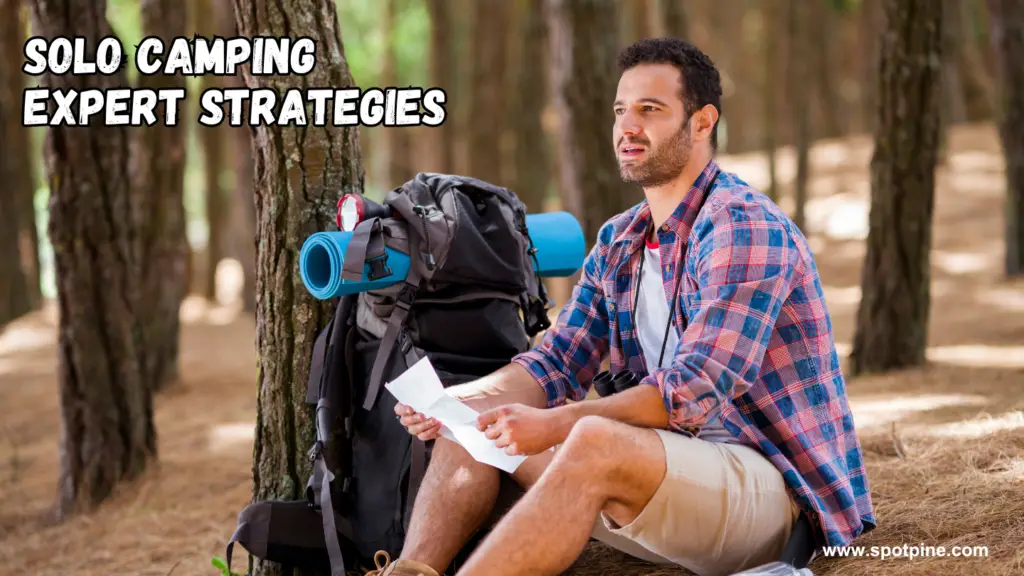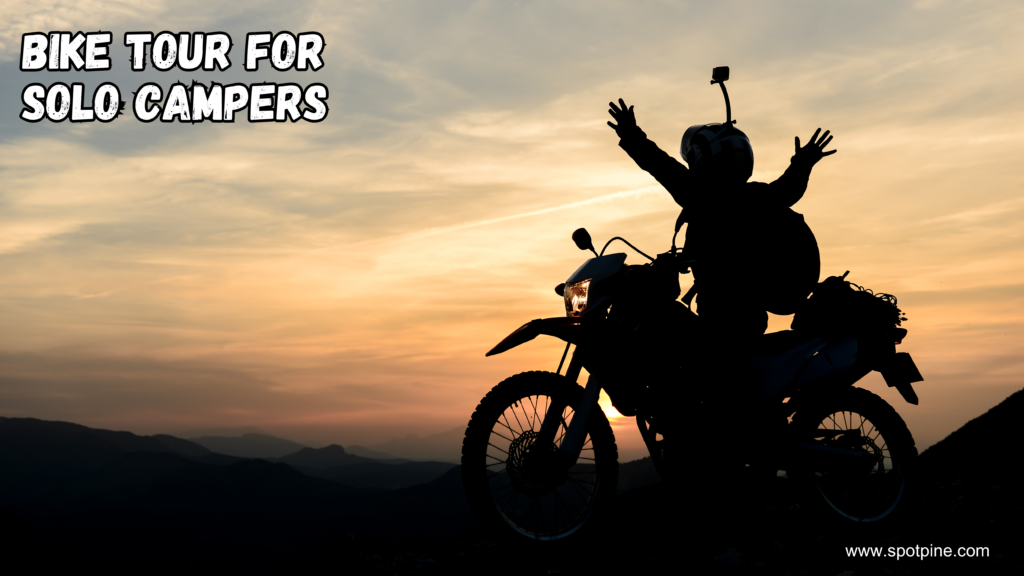Solo camping tips include thorough planning, essential equipment, self-reliance, and safety precautions for a successful and enjoyable experience in the great outdoors. Venturing out into the wilderness alone can be an exhilarating and rewarding experience.
Solo camping allows you to disconnect from the chaos of daily life, reconnect with nature, and discover your own inner strength. However, it also requires careful preparation and consideration. From choosing the right camping spot to packing essential gear, and ensuring personal safety, solo camping demands a unique set of skills and precautions.
We will explore some valuable tips and insights to help you make the most out of your solo camping adventure. Whether you are a seasoned outdoor enthusiast or embarking on your very first solo trip, these tips will assist you in navigating the challenges and seizing the opportunities that solo camping presents.
Choosing The Right Location
When embarking on a solo camping adventure, choosing the right location is crucial to ensure a safe and enjoyable experience. Consider the season and weather conditions, as well as research any local regulations that may impact your camping plans.
Consider The Season And Weather:
Before setting off on your solo camping trip, take the time to consider the season and weather conditions of your chosen location. This will help you prepare adequately and ensure your safety and comfort throughout your adventure. It’s important to note that different seasons offer different experiences, and the weather can change unexpectedly, so it’s essential to be prepared for any situation.
In the summer months, camping near bodies of water such as lakes or rivers can provide a refreshing experience, allowing you to cool off and partake in water activities. However, it’s crucial to stay mindful of safety precautions and be aware of potential risks like strong currents or sudden storms.
In the fall, camping amidst colorful foliage can create a picture-perfect backdrop for your adventure. Additionally, cooler temperatures can make hiking and exploring more enjoyable. Remember to pack appropriate clothing and gear to stay warm and comfortable during colder nights.
Winter camping can be a thrilling experience for the more adventurous souls. However, it’s essential to be well-prepared for the lower temperatures and challenging conditions. Make sure to pack warm clothing, a sturdy tent, and sleeping gear suitable for colder weather. Research avalanche risks and ensure you choose a location with proper facilities and phone service in case of emergencies.
Spring camping offers the opportunity to witness nature’s reawakening as plants and animals emerge from their winter slumber. Keep in mind that spring weather can be unpredictable, so be prepared for rain showers and fluctuating temperatures. Be mindful of mud and dampness, and choose a campsite with good drainage to avoid any discomfort.
Research Local Regulations:
In order to have a successful solo camping experience, it’s crucial to research and familiarize yourself with any local camping regulations in your chosen area. These regulations can include restrictions on campfires, camping permits, and specific rules and guidelines for each campsite or national park.
| Research Local Regulations: | Why Is It Important? |
| Check for campfire regulations. | Ensure you are aware of any restrictions or bans to prevent accidental wildfires. |
| Look for any permit requirements. | Ensure you have all the necessary permits to legally camp in the area. |
| Familiarize yourself with specific rules for each campsite or national park. | Respecting the rules and guidelines ensures the preservation of the environment and a positive camping experience for all. |
By conducting thorough research on local regulations before your solo camping trip, you can ensure a smooth and hassle-free adventure, avoiding any legal issues or conflicts with authorities. Remember, respecting the environment and adhering to regulations is not only important for your own enjoyment but also for the preservation of nature and future generations of campers.
Essential Gear And Equipment
Solo camping can be a rejuvenating and rewarding experience, but having the right gear and equipment is essential for a successful trip. The right tools and supplies can make all the difference, ensuring comfort, safety, and a seamless camping experience. Here are the key elements of essential gear and equipment for solo camping.
Proper Shelter And Sleeping Gear
One of the most crucial aspects of solo camping is ensuring you have the right shelter and sleeping gear to protect you from the elements and provide a comfortable night’s rest. A high-quality tent that is lightweight yet durable is a must-have, offering protection from rain and insects. Additionally, a sleeping bag suitable for the prevailing climate is essential to keep you warm through the night. Consider a sleeping pad for added comfort and insulation from the ground.
Cooking Supplies And Food Storage
When it comes to cooking supplies and food storage, having the right tools and containers can make meal preparation enjoyable and hassle-free. A portable stove or campfire cooking equipment allows you to prepare hot meals, while cookware and utensils are essential for cooking and eating. Opt for lightweight, easily packable options. To keep your food secure and protected, invest in bear-resistant food containers or hanging systems to store your provisions safely away from wildlife.
Safety Precautions
Solo camping can be a thrilling adventure, but it’s essential to prioritize safety precautions. Being prepared with the right emergency tools and first aid supplies can make a significant difference in handling unexpected situations. Below we’ve outlined some safety measures to consider for a secure solo camping experience.
Emergency Communication Devices
Carrying emergency communication devices such as a satellite phone, personal locator beacon, or a two-way radio is crucial for staying connected in remote areas where cellular reception may be limited or non-existent. These devices can be a lifeline in case of emergencies, allowing you to call for help when needed.
First Aid Kit Essentials
A well-equipped first aid kit is a must-have for solo campers. It should include essential items such as adhesive bandages, antiseptic wipes, gauze pads, tweezers, scissors, blister treatment, pain relievers, and any personal medications. Always ensure your first aid kit is easily accessible and well-stocked for any potential injuries or medical needs.
Solo Camping Skills
When it comes to solo camping, having the right skills is essential to ensuring an enjoyable and safe experience. From setting up camp alone to navigating the area, mastering these skills will enable you to have a successful solo camping adventure. In this article, we will explore some key skills that every solo camper should possess.
Setting Up Camp Alone
Setting up camp alone might seem daunting at first, but with some practice and preparation, you’ll become a pro in no time. Here are a few tips to help you set up your campsite:
- Choose a suitable location: Look for a flat and dry spot, away from any potential hazards such as dead trees or rocks.
- Pitch your tent: Follow the manufacturer’s instructions to pitch your tent properly. Ensure that it is securely staked down to withstand any unexpected weather conditions.
- Organize your gear: Keep your camping gear organized by creating designated areas for essentials like cooking utensils, food, and personal items.
Navigating The Area
Navigating the area is crucial when camping alone to avoid getting lost or disoriented. Here are some skills to help you navigate with confidence:
- Study the map: Familiarize yourself with the campground map or trail guides before setting off. Take note of landmarks and key points along your planned route.
- Use a compass: Learn how to use a compass to determine your direction accurately. This skill can be a lifesaver if you accidentally stray off course.
- Mark your trail: Leave signals behind such as brightly colored ribbons or rocks to mark your trail. This will help you find your way back easily.
By mastering these solo camping skills, you’ll be well-prepared to tackle the challenges of camping alone. Remember, practice makes perfect, so don’t be afraid to venture out on your own and gain experience. Happy camping!
Food Planning And Preparation
Explore food planning and preparation for solo camping with practical tips on meal prepping and easy recipes. Enhance your outdoor experience by packing lightweight, non-perishable foods and utilizing versatile cooking tools for efficient and delicious meals in the wilderness.
Meal Ideas And Packability
When solo camping, planning your meals efficiently and ensuring they are easy to pack is crucial. Below are some meal ideas and tips on how to pack them for your adventure.
- Create simple one-pot meals like pasta dishes or stir-fries for easy cooking and minimal cleanup.
- Prep ingredients in advance and store them in sealed containers to save time at the campsite.
- Opt for lightweight and compact foods that are high in nutrition such as nuts, seeds, and dehydrated fruits.
Hydration Tips
Staying hydrated is essential when camping solo. Here are some tips to ensure you have enough water throughout your trip:
- Carry a reusable water bottle and consider a portable water filter for refilling from natural sources.
- Pack electrolyte tablets or powders to replenish essential minerals lost through sweating.
- Set a hydration schedule to remind yourself to drink water regularly, especially in hot weather.
Mindful Solo Camping
Mindful solo camping involves intentionally focus on self-awareness and appreciation of nature’s beauty.
Embracing Solitude And Quiet
Solo camping provides a chance to unplug and enjoy the serenity of nature’s solitude.
Mental Preparedness
Prioritize mental preparedness by devising coping mechanisms to handle unforeseen challenges.
Leave No Trace Principles
Discover essential Leave No Trace Principles for solo camping to minimize environmental impact and preserve nature. Implement proper waste disposal, respect wildlife, and leave surroundings undisturbed for a sustainable outdoor experience.
When embarking on a solo camping adventure, it is crucial to adhere to the Leave No Trace Principles to minimize your impact on the environment. These principles guide outdoor enthusiasts in practicing responsible and sustainable camping habits. By following these principles, you can preserve the natural beauty of your surroundings and leave the wilderness undisturbed for future generations to enjoy.
Pack It In, Pack It Out
One of the core principles of Leave No Trace camping is the “Pack It In, Pack It Out” mantra. This means that any waste, including food scraps, packaging, and personal items, should be carried out of the campsite and properly disposed of. To make this easier, bring sturdy trash bags or containers to collect your waste. By leaving your campsite cleaner than you found it, you ensure that the next visitor can experience the wilderness in its pristine state.

Respect Wildlife
Another crucial aspect of Leave No Trace camping is respecting wildlife. As you venture into their natural habitats, it is important to remember that you are merely a visitor in their home. To ensure their well-being and your safety, keep a respectful distance and observe animals from afar. Do not attempt to feed, touch, or interact with them, as this can disrupt their natural behavior and lead to dangerous situations. Remember, wildlife thrives best when left undisturbed, allowing you to appreciate their beauty from a distance.
Solo Camping Etiquette
Solo camping can be a peaceful and rejuvenating experience, allowing you to connect with nature and find solitude. However, practicing proper camping etiquette is essential to ensure a harmonious coexistence with fellow campers and to preserve the natural environment. Below are some important considerations to keep in mind when engaging in solo camping trips.
Noise Considerations
Being mindful of noise levels is crucial when camping solo. Remember that sound travels easily in outdoor settings, so minimizing loud conversations, music, and other disruptive noises is essential to maintain a tranquil atmosphere for all campers.
Campsite Courtesy
Campsite courtesy is paramount to a positive solo camping experience. Adhering to leave-no-trace principles, such as properly disposing of waste and respecting designated camping areas, showcases respect for the environment and fellow campers. Additionally, maintaining a clean and organized campsite not only promotes safety but also enhances the overall camping experience for everyone.
FAQs On Solo Camping Tips
What Are The Essential Gears For Solo Camping?
When solo camping, pack a durable tent, sleeping bag, portable stove, first aid kit, multi-tool, and appropriate clothing. Additionally, bring a reliable navigation system, water purification tablets, and a portable power source for emergencies.
Is It Safe For Women To Camp Alone?
Solo camping is generally safe for women when taking necessary precautions. Choose well-populated camping sites, inform someone of your location, trust your instincts, and be prepared for emergencies. By following safety guidelines, women can have a rewarding solo camping experience.
How To Stay Safe From Wildlife While Solo Camping?
To stay safe from wildlife during solo camping, secure food in bear-proof containers, keep the campsite clean, avoid cooking near the sleeping area, and use bear spray if needed. Be aware of local wildlife encounters and always follow proper camping regulations.
Is It Necessary To Have Camping Experience For Solo Camping?
While prior camping experience is beneficial, it’s not mandatory for solo camping. You can develop essential skills through online resources, practice setting up camp, and learn basic survival skills. Start with short trips and gradually work your way up to longer solo camping adventures.
Solo camping can be a thrilling and empowering experience. By following these tips, you can make the most out of your adventure. From planning your trip and preparing the necessary equipment to staying safe and aware of your surroundings, these guidelines will ensure a successful solo camping experience.
So, embrace the solitude, connect with nature, and create unforgettable memories on your solo camping journey. Happy camping!




Pingback: Solo Camping in USA: A Guide for International Students
Pingback: How to Conquer Solo Camping Fear?